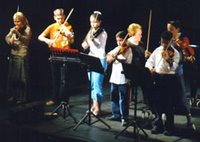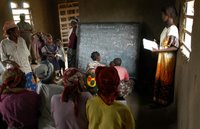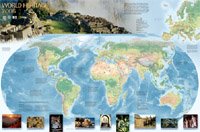
Eighteen students and two teachers from Baghdad’s Music and Ballet School studied instrument lessons, solfege theory, music appreciation and ballet at a summer music programme in Jordan over the summer 2006. The programme was sponsored by UNESCO, the
Arab Alliance of Women in Music and several other partners.
In an interview, Mohamed Djelid, Director of UNESCO’s Iraq Office (currently in Amman Jordan), explains how music can help Iraqi youth heal from the traumas of war.
Question: Why is UNESCO supporting such an activity?
Djelid: Because this is precisely UNESCO’s mandate. Culture and Education are core issues for us. Culture brings out the resourcefulness of young people. It is the one fixed point to which a community in distress turns as it tries to rebuild itself. Many of the Iraqi students refrain from attending classes in Baghdad due to the insecurity. They are traumatized and detached from an intellectual and creative environment. To regain this essential momentum is one of the objectives of the Summer School.
Question: Can you heal the trauma of daily violence through music? Djelid: Yes, because time off from war is a break in peace. This is a value in itself. A young student shared with us the advice his father gives him: “If you cannot bear the noise of bombs, just think of music”. This is healing through music.
Question: Is a one-time event sufficient?
Djelid: We will support the organizers - the Arab Alliance of Women in Music (AAWM) – to continue this very successful debut and maybe even organize a Winter School in the beginning of 2007.
Question: How will you support them?
Djelid: By organizing support. For instance, a leading Arab Communication Company with Iraqi seniors and experts has prepared a documentary on Baghdad’s Music and Ballet School and the students’ work during the Summer School in Jordan. As artistic as the documentary is, it conveys a strong message to the international community to support this specific project as well as other UNESCO activities in the field of education and particularly culture.
Please contact the UNESCO Iraq Office for a free copy of the documentary.
© UNESCO
 On August 31st, 2006, the Director-General of UNESCO, Koïchiro Matsuura, welcomed the donation by Japan of US$2.18 million for the "Inter Agency Programme on the Sustainable Rehabilitation of War Victims in Burundi," which will be channeled through the Trust Fund For Human Security and involve a number of United Nations agencies, including UNESCO.
On August 31st, 2006, the Director-General of UNESCO, Koïchiro Matsuura, welcomed the donation by Japan of US$2.18 million for the "Inter Agency Programme on the Sustainable Rehabilitation of War Victims in Burundi," which will be channeled through the Trust Fund For Human Security and involve a number of United Nations agencies, including UNESCO.
